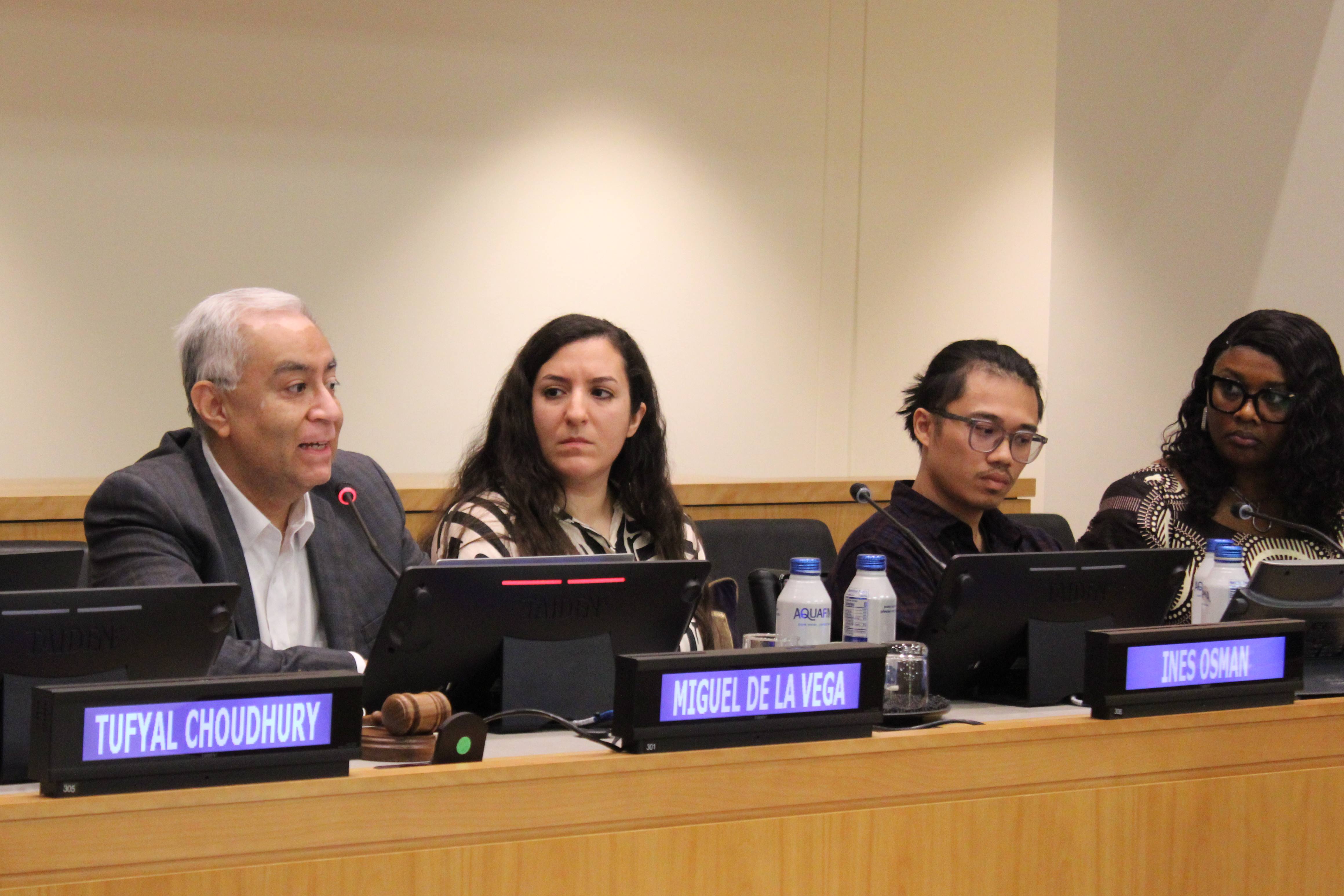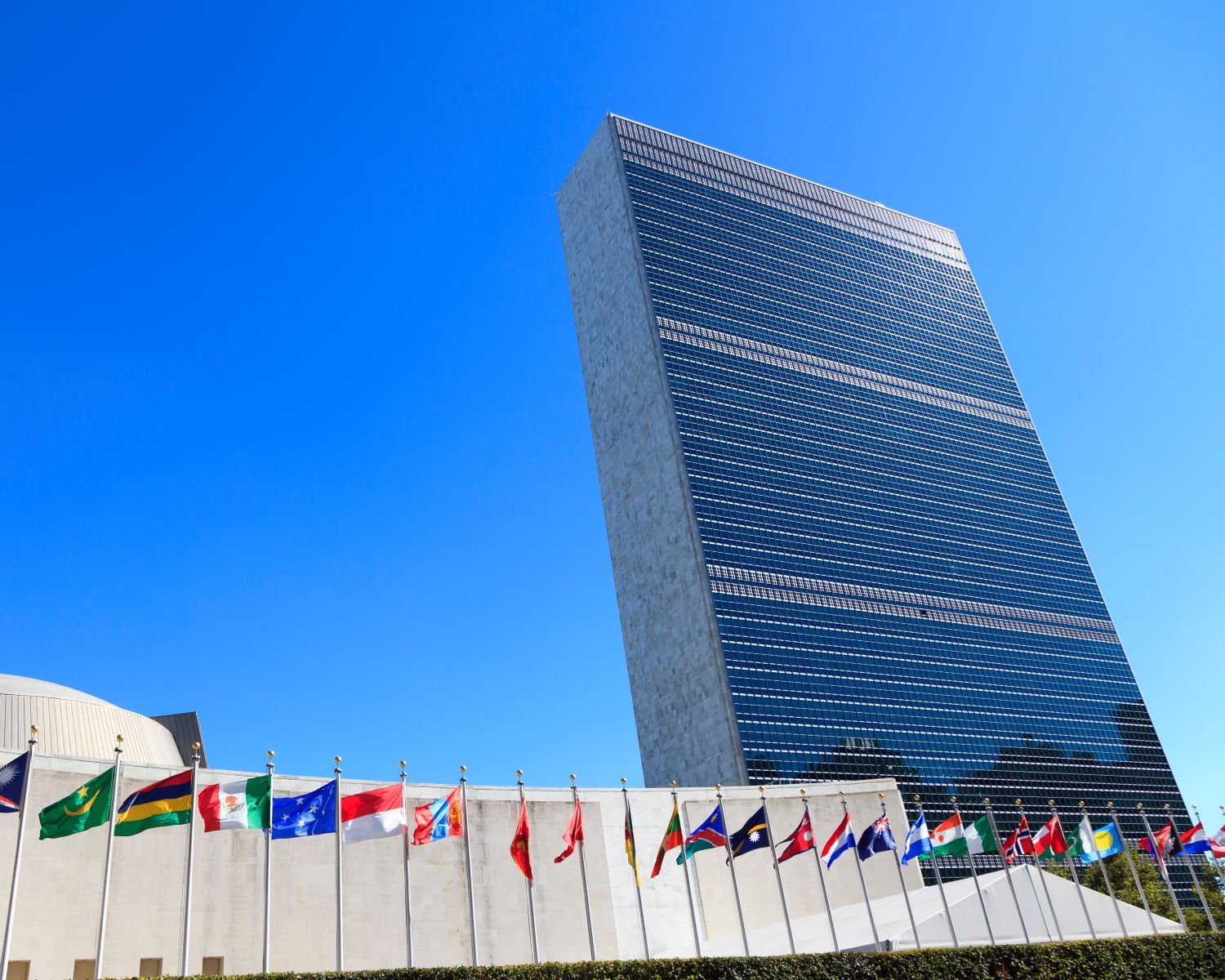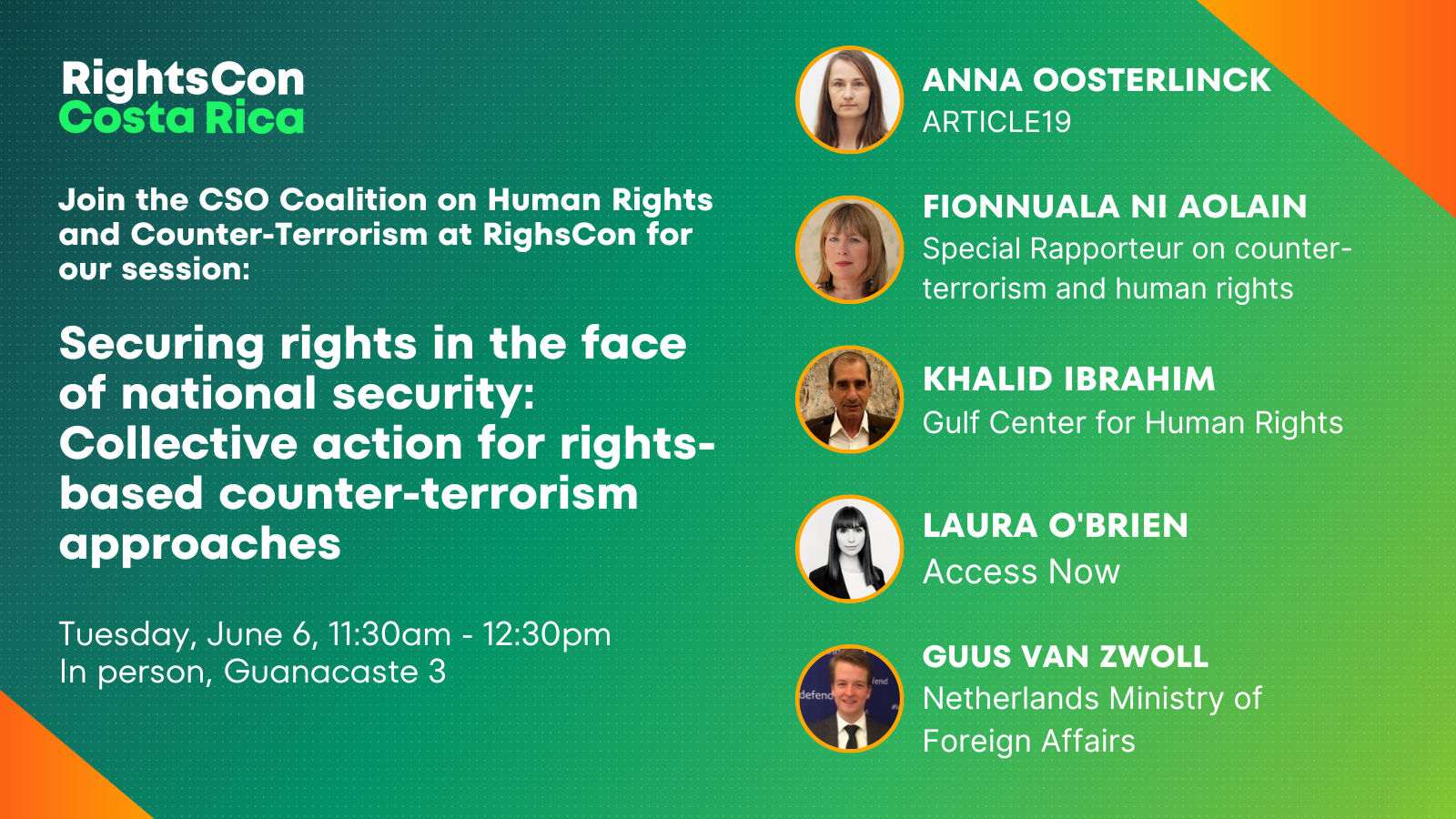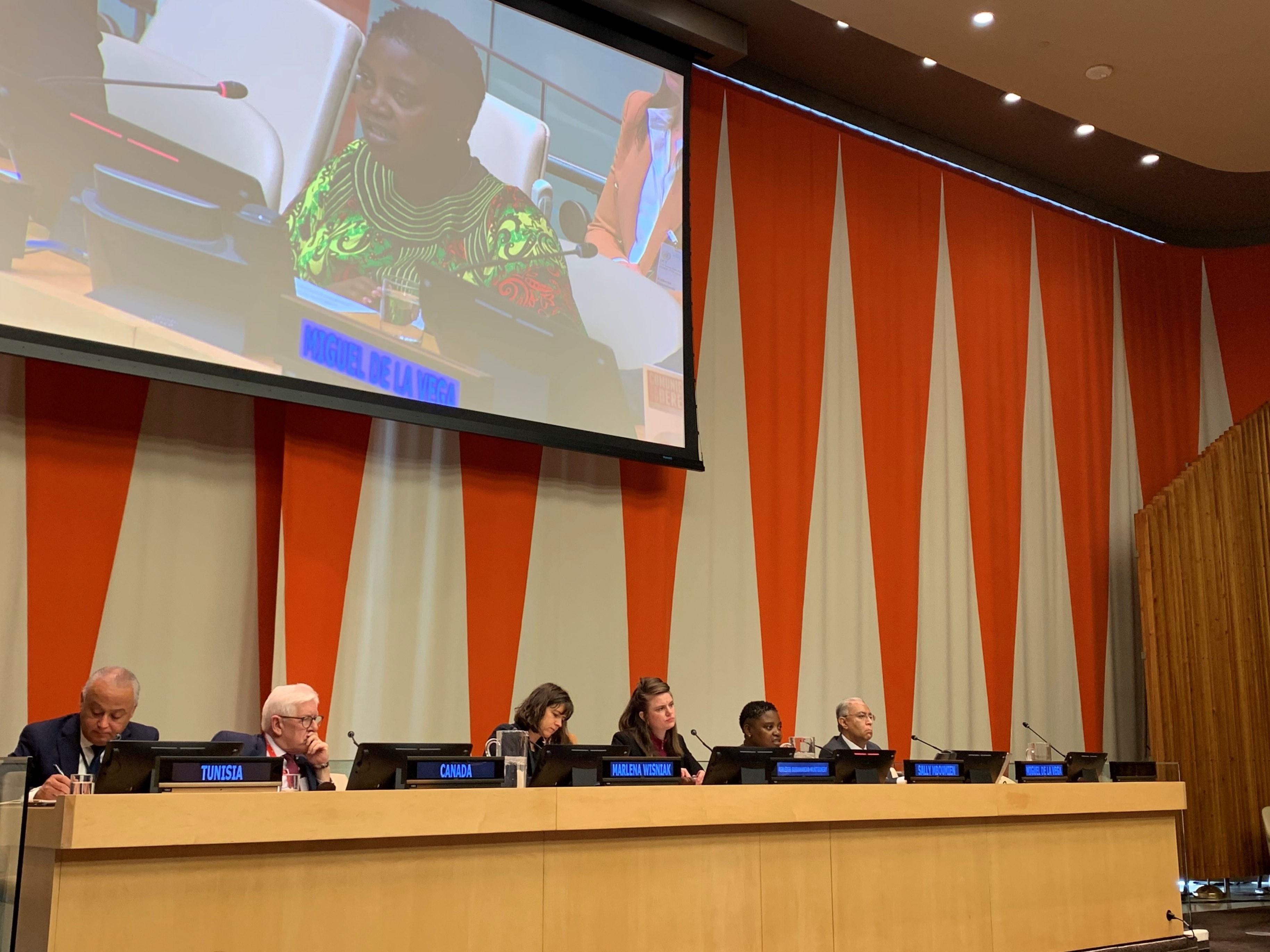
On 8 September 2025, the CSO Coalition on Human Rights and Counter-Terrorism launched, Behind Closed Ledgers: The Transparency Gap Affecting the UN's Counter-Terrorism Programming. The event featured Ben Donaldson, Lead Researcher and report author, and Megan Manion, Research Scholar and Clinical Lecturer in Law at Yale Law School, Lowenstein International Human Rights Clinic, who discussed the findings, recommendations, and how all stakeholders can take the report forward.
The report is based upon an extensive transparency audit of publicly available data related to the UN Office of Counter-Terrorism’s resource mobilization, budget allocation, and expenditure.
It draws a number of strong findings on the level of transparency of UNOCT’s financial reporting:
- There is no centralized list of who is funding what programmes at UNOCT, making it difficult for stakeholders to discern who is driving the priorities of UNOCT’s work;
- UNOCT fails to provide an overview of earmarked funding and to define what constitutes an earmarked contribution despite reliance upon this funding;
- UNOCT’s financial reporting is not consistent, in fact, there is a third of UNOCT’s funding (not including the UNCCT), that is reported to a lower standard.
Megan, in her independent academic capacity, highlighted that “transparency really can only be measured by what stakeholders, civil society, Member States, donors and non-donors, can actually access and see.”
Urgent action should be taken to strengthen UNOCT transparency to standards expected of a major multilateral institution. As Ben said during the launch, "transparency is achievable and overdue. If the UN Peacebuilding Fund and UN Women can do it, the UN Office of Counter-Terrorism can too."
The report is launched ahead of the opening of the 80th session of the UN General Assembly and comes at a critical time as UN Member States prepare for the Eighth Review of the Global Counter-Terrorism Strategy in early 2026.

The report for the Scoping Study on Independent Civil Society - UN Counterterrorism Engagement was launched in New York in May 2024. This study was conducted by Rights and Security International, a founding member of the CSO Coalition on Human Rights and Counter-Terrorism, and the Global Center on Cooperative Security with support from an advisory committee.
Based on consultations with over 170 civil society representatives, the study found that the United Nations has failed to meaningfully engage with and protect civil society in its counter-terrorism efforts. The study outlines seven pre-conditions necessary for meaningful civil society engagement in UN counter-terrorism efforts and offers recommendations to achieve these preconditions.
Several Coalition members spoke during the official launch event at UN Headquarters in New York, which highlighted the failings of the UN counter-terrorism architecture in including and protecting civil society. Coalition members on the panel highlighted specific challenges civil society around the world face when engaging on counter-terrorism issues at the UN. A recording of the launch event is available on UN Web TV.

On May 23 2024, the CSO Coalition on Human Rights and Counter-Terrorism in partnership with the Special Rapporteur on the promotion and protection of human rights and fundamental freedoms while countering terrorism hosted a roundtable dialogue: “Promoting civil society inclusion in African-led counter-terrorism efforts”. The hybrid event brought together African civil society, African Member States and regional representatives, UN offices, and key stakeholders and allies to discuss future counter-terrorism initiatives in Africa. The dialogue provided an opportunity to build collaboration between African civil society and African Member States in counter-terrorism efforts in Africa.
During the roundtable, participants shared important perspectives on the negative impact of some counter-terrorism policies on human rights and civil society. Participants called for the United Nations counterterrorism architecture to strengthen efforts to be inclusive of a broad cross-section of civil society, to ensure human rights assessments were conducted before all engagements, and to focus programmatic efforts on addressing the root causes of violent terror acts.
On 23 October 2023, the CSO Coalition on Human Rights and Counter-Terrorism, in partnership with the United Nations Special Rapporteur on the promotion and protection of human rights and fundamental freedoms while countering terrorism, the Permanent Mission of Canada to the UN, and the Permanent Mission of Switzerland to the UN, hosted the side event, “From Policy to Practice: Implementation of the Global Study on the Impact of Counter-Terrorism on Civil Society & Civic Space”.
This side event brought together civil society, Member States, the United Nations and other stakeholders to discuss avenues to implement the recommendations presented in the Global Study on the Impact of Counter-Terrorism Measures on Civil Society and Civic Space, produced by the Special Rapporteur on the promotion and protection of human rights and fundamental freedoms while countering terrorism, Professor Fionnuala Ní Aoláin. The core analysis and findings of the Global Study on the Impact of Counter-Terrorism Measures on Civil Society and Civic Space were institutionalized in the Report of the Special Rapporteur on the promotion and protection of human rights and fundamental freedoms while countering terrorism transmitted to the General Assembly during the 78th session.
Speakers included:
Prof. Fionnuala Ní Aoláin, UN Special Rapporteur on the promotion and protection of human rights and fundamental freedoms while countering terrorism
H.E. Mr. Robert Rae, Permanent Representative, Permanent Mission of Canada to the UN
Ms. Tanya Boulakovski, Legal Researcher, MENA Rights Group
Mr. Rio Hada, Chief, Equality, Development and Rule of Law Section, Office of the High Commissioner for Human Rights
Ms. Rahma Ramadhan, Research Fellow, Centre for Human Rights and Policy Studies
A summary of the event is available here.
On 15 June 2023, the Gulf Centre for Human Rights (GCHR) in cooperation with Human Rights Watch (HRW), the Cairo Institute for Human Rights Studies (CIHRS), and the Civil Society Coalition on Human Rights and Counter-Terrorism held an event in New York to discuss the “Impact of Counter-Terrorism Policies on Human Rights in the Middle East and North Africa” (MENA).
Speakers:
Khalid Ibrahim, Gulf Centre for Human Rights (GCHR), Moderator
Dr. Hala Al-Dosari, Saudi human rights defender and gender scholar
Neil Hicks, Cairo Institute for Human Rights Studies (CIHRS)
Solafa Magdy, Egyptian journalist, human rights defender and former prisoner
Joshua Colangelo-Bryan, Human rights lawyer
Letta Tayler, Human Rights Watch (HRW).

June 6, 2023 | 11:30am - 12:30pm CST | In person only
Since 9/11, the UN Security Council has adopted a range of counter-terrorism (CT) resolutions imposing obligations on states to adopt surveillance technologies and other measures with significant negative implications for human rights, especially of already at-risk communities. The vast UN CT architecture that supports the implementation of these and other resolutions has largely failed to understand and integrate human rights safeguards, enabling downstream harms and providing opportunities for the abuse of CT measures. After years of exclusion, there appears to be an opening for civil society participation in UN CT policy-making, in part due to sustained pressure from CSOs. Our session will explore with participants specific opportunities for civil society engagement over the coming year.
To achieve this, the session will include: a) an overview of current trends of the UN counter-terrorism agenda and its human rights implications; b) examples of how UN counter-terrorism policies affect individuals and communities at the regional/national level; c) a presentation of the work of the Civil Society Coalition on Human Rights and Counter-terrorism, with an emphasis on key issues and advocacy opportunities related to CT and technology. We will focus on two particular opportunities for engagement in 2023: the 8th review of the Global Counter-Terrorism Strategy, and the development of UN Guiding Principles on Countering the Use of New and Emerging Technologies for Terrorist Purposes (in line with the Delhi Declaration). We will open the dialogue with participants to address their questions, hear their experiences working on these issues, and collectively explore advocacy opportunities and areas for future collaboration.
Host institution: Civil Society Coalition on Human Rights and Counter-terrorism | Office of the United Nations Special Rapporteur on the protection and promotion of human rights and fundamental freedoms while countering terrorism

On April 25th, 2023, the CSO Coalition on Human Rights and Counter-Terrorism hosted a Civil Society Town Hall as part of the 8th review of the Global Counter-Terrorism Strategy. Coalition members Charity & Security Network, ARTICLE19, and the European Center for Not-for-Profit Law led in organizing and moderating the event, and civil society speakers joined us from COMAGEND Cameroon, Unidosc (Mexico), and Sri Lanka. The co-facilitators of the GCTS review, the Permanent Representatives of Canada and Tunisia, co-hosted the Town Hall and provided opening and closing remarks.
This was the first time the Civil Society Town Hall was included on the GCTS road map, presenting the only formal opportunity for civil society to engage during the GCTS review process. Civil society representatives at the Town Hall shared suggestions for Member States negotiating the GCTS, touching on topics relating to oversight and accountability for the UN's growing counter-terrorism architecture, ensuring countering terrorism financing (CFT) measures do not hamper civil society's access to funding, and the need for human rights safeguards and impact assessments in policies and activities relating to new and emerging technologies. Throughout the event, speakers stressed the importance of adopting a human rights-based approach and intersectional feminist perspective throughout the GCTS and related activities, as well as the value of meaningful civil society engagement in counter-terrorism efforts.
A recording of the Town Hall is available here.
In the nearly two decades since 9/11, the international community has implemented counter-terrorism laws and policies intended to make the world safer. Unfortunately, these measures have at times violated human rights, hampered peacebuilding, and obstructed delivery of humanitarian and development assistance. Two decades on, and with the Covid-19 crisis now reshaping the world, it is critical that we take stock of how we can improve counter-terrorism measures while protecting rights, facilitating delivery of aid, and building peaceful societies.
This High-Level Convening on UN Counter-Terrorism and Human Rights on June 11, 2020 will bring together representatives of UN Member States, UN offices, and civil society to assess the impact of counter-terrorism measures on human rights, peacebuilding, and humanitarian and development assistance. Participants will also examine the effectiveness and inclusivity of the UN Global Counter-Terrorism Strategy and UN counter-terrorism bodies, reflect on the implications of UN counter-terrorism policies shaping Covid-19 responses, and identify priority areas for reforming the UN counter-terrorism architecture.
By assembling diverse stakeholders, this event aims to foster discussion on how together we can move toward a more inclusive, people-centered approach to security in a post Covid-19 world. We also hope it will lead to an improved UN Global Counter-Terrorism Strategy in the 75th Session of the General Assembly.
Speakers:
Ms. Fionnuala D. Ní Aoláin, UN Special Rapporteur on the promotion and protection of human rights and fundamental freedoms while countering terrorism
Ms. Ilze Brands Kehris, Assistant Secretary-General for Human Rights and Head of the Office of the High Commissioner for Human Rights (OHCHR) in New York
Mr. David Lewis, Executive Secretary, Financial Action Task Force
Ambassador Olof Skoog, Head of the Delegation of the European Union to the United Nations
Moderator: Ms. Yasmine Ahmed, Executive Director, Rights and Security International
In the nearly two decades since 9/11, the international community has implemented counter-terrorism laws and policies intended to make the world safer. Unfortunately, these measures have at times violated human rights, hampered peacebuilding, and obstructed delivery of humanitarian and development assistance. Two decades on, and with the Covid-19 crisis now reshaping the world, it is critical that we take stock of how we can improve counter-terrorism measures while protecting rights, facilitating delivery of aid, and building peaceful societies.
This High-Level Convening on UN Counter-Terrorism and Human Rights on June 11, 2020 will bring together representatives of UN Member States, UN offices, and civil society to assess the impact of counter-terrorism measures on human rights, peacebuilding, and humanitarian and development assistance. Participants will also examine the effectiveness and inclusivity of the UN Global Counter-Terrorism Strategy and UN counter-terrorism bodies, reflect on the implications of UN counter-terrorism policies shaping Covid-19 responses, and identify priority areas for reforming the UN counter-terrorism architecture.
By assembling diverse stakeholders, this event aims to foster discussion on how together we can move toward a more inclusive, people-centered approach to security in a post Covid-19 world. We also hope it will lead to an improved UN Global Counter-Terrorism Strategy in the 75th Session of the General Assembly.
Speakers:
Dr. Sehar Iqbal, Founder and Director, Sajid Iqbal Foundation (Indian Administered Jammu and Kashmir)
Dr. Mutuma Ruteere, Director, Centre for Human Rights and Policy Studies (Kenya)
Martin Scheinin, first United Nations Special Rapporteur on human rights and counter-terrorism
Moderator: Ben Hayes, Director, AWO a new data rights agency; fellow, Transnational Institute
In the nearly two decades since 9/11, the international community has implemented counter-terrorism laws and policies intended to make the world safer. Unfortunately, these measures have at times violated human rights, hampered peacebuilding, and obstructed delivery of humanitarian and development assistance. Two decades on, and with the Covid-19 crisis now reshaping the world, it is critical that we take stock of how we can improve counter-terrorism measures while protecting rights, facilitating delivery of aid, and building peaceful societies.
This High-Level Convening on UN Counter-Terrorism and Human Rights on June 11, 2020 will bring together representatives of UN Member States, UN offices, and civil society to assess the impact of counter-terrorism measures on human rights, peacebuilding, and humanitarian and development assistance. Participants will also examine the effectiveness and inclusivity of the UN Global Counter-Terrorism Strategy and UN counter-terrorism bodies, reflect on the implications of UN counter-terrorism policies shaping Covid-19 responses, and identify priority areas for reforming the UN counter-terrorism architecture.
By assembling diverse stakeholders, this event aims to foster discussion on how together we can move toward a more inclusive, people-centered approach to security in a post Covid-19 world. We also hope it will lead to an improved UN Global Counter-Terrorism Strategy in the 75th Session of the General Assembly.
Speakers:
Mr. Naseer Ahmed Faiq, Minister Counsellor, Permanent Mission of Afghanistan to the United Nations
Ms. Sara Hossain, lawyer at the Supreme Court of Bangladesh and an honorary executive director of Bangladesh Legal Aid and Services Trust
Mr. David Izquierdo Ortiz de Zárate, Counsellor, Permanent Mission of Spain to the United Nations
Ms. Jessica Murphy, September Eleventh Families for Peaceful Tomorrows
Mr. Matt Pollard, Senior Legal Adviser & UN Representative, International Commission of Jurists
Moderator: Mr. Martin O’Brien, Director, Social Change Initiative
In the nearly two decades since 9/11, the international community has implemented counter-terrorism laws and policies intended to make the world safer. Unfortunately, these measures have at times violated human rights, hampered peacebuilding, and obstructed delivery of humanitarian and development assistance. Two decades on, and with the Covid-19 crisis now reshaping the world, it is critical that we take stock of how we can improve counter-terrorism measures while protecting rights, facilitating delivery of aid, and building peaceful societies.
This High-Level Convening on UN Counter-Terrorism and Human Rights on June 11, 2020 will bring together representatives of UN Member States, UN offices, and civil society to assess the impact of counter-terrorism measures on human rights, peacebuilding, and humanitarian and development assistance. Participants will also examine the effectiveness and inclusivity of the UN Global Counter-Terrorism Strategy and UN counter-terrorism bodies, reflect on the implications of UN counter-terrorism policies shaping Covid-19 responses, and identify priority areas for reforming the UN counter-terrorism architecture.
By assembling diverse stakeholders, this event aims to foster discussion on how together we can move toward a more inclusive, people-centered approach to security in a post Covid-19 world. We also hope it will lead to an improved UN Global Counter-Terrorism Strategy in the 75th Session of the General Assembly.
Speakers:
Ms. Hina Jilani, co-founder of the Human Rights Commission of Pakistan and the Women’s Action Forum and former UN Special Representative on Human Rights Defenders
Ambassador Kais Kabtani, Permanent Representative of Tunisia to the United Nations
Ms. Navi Pillay, former UN High Commissioner for Human Rights
Ambassador Agustín Santos Maraver, Permanent Representative of Spain to the United Nations
Moderator: Ms. Vivian Newman Pont, Executive Director, Center for Law, Justice, and Society (Dejusticia), Colombia